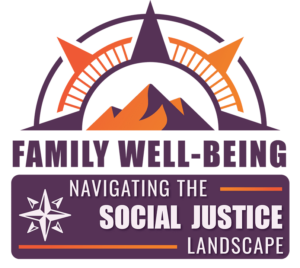By Karen Shirer, Ph.D.
Summary
- Diverse service members and their families face unique challenges related to diversity, equity, and inclusion when making a permanent change of station (PCS).
- Professionals who serve military families can provide support and guidance to diverse service members and their families in preparing for transitions.
- Professional development for family-serving professionals can strengthen their skills in using a social justice lens when supporting military families in transition.
“When one can see no future, all one can do is the next right thing.”
– Pabbie (A wise, old troll on Disney’s “Frozen II”)
In June, I completed the OneOp Military Family Readiness Academy (MFRA), Family Well-Being: Navigating the Social Justice Landscape. The above quote was shared in a YouTube video by Alicia Chin Greer, a Chinese-American veteran, during the MFRA.
The quote reminds us that when we do not know the future on seemingly intractable issues like racism, exclusion, and injustice faced by service members and military families, we need to not give up but do the next right thing.
The next right thing we can all do is to grow our understanding of the experiences of diverse service members and their families, and research-based approaches for promoting diversity, equity, and inclusion (DEI).
We invite you to engage in the archived 2022 MFRA to equip yourself with the skills to identify DEI barriers that impact a family’s health and well-being. The MFRA consists of three online courses and two recorded panel discussions, plus wrap-around activities.
The Academy series explores the intersections between engaging a social justice mindset as a family service professional and supporting the well-being of diverse military families. Below I highlight my insights on the intersection of DEI and Permanent Change of Station (PCS) discussed in the second-panel discussion.
Permanent Change of Station and the Need for a Social Justice Lens
The results of a recent study* showed that military families of color considered racial and ethnic discrimination when deciding about a PCS. For example, 46% of respondents of color used discrimination as one factor when ranking their choices of installations. Another 42% considered safety concerns for their families when accepting a PCS.
Eddie Mentzer, a military spouse, and a Department of Defense (DoD) employee shared his story of a mixed-race family during the second-panel discussion. His wife’s position in the Air Force has led to multiple PCSs for their family. They are currently located in Birmingham, Alabama, and are preparing for a PCS to Florida this fall.
Eddie discussed the many lessons they have learned as a family living in Birmingham, most of them positive and beneficial. Without going into detail, he noted that there were challenges and anticipates having new, but similar, experiences in Florida. Both his family’s experiences and the survey results above remind us that a social justice lens is needed as we prepare families to leave one community and move to another. Next, I discuss the challenges that diverse families face when they PCS.
Headwinds and Tailwinds
Dr. Keith Tidball during the second-panel discussion described that one’s environment creates tailwinds and headwinds for their resilience and well-being. This fact is especially true for military families when they PCS to a new community.
The terms tailwinds and headwinds come from the aviation world and you may have heard these terms used by bicycle riders. A headwind means that the wind is blowing in the opposite direction of the plane or bicycle, causing turbulence and greater energy usage. Whereas, tailwinds blow on the back of the aircraft or bicycle, leading to less energy usage and smoother riding.
Structural forces either support (tailwinds) or undermine (headwinds) a Service Member’s (SM) and their family’s well-being and readiness. Racism, exclusion, and injustice are unique headwinds faced by diverse individuals affiliated with the military. Dr. Tidball emphasized that it is not about good or bad people but about these structural forces.
How can you support diverse military families as they face potential DEI headwinds as they PCS?
- Share information with families about their new communities that you have access to. You can do so by providing them with contacts and resources about the new community. It might also be helpful to connect them with other diverse families who have PCS’d to the same community. Here are two examples from Military OneSource:
- Support families to conduct their own research about DEI issues that they might face. The military installation link above would be a good place to begin as well as any contacts you provided. Have them seek out information about DEI issues related to housing, spousal employment opportunities, education, loss of trusted support networks, and access to health care.
- Encourage families to take advantage of all the available military and community resources as they make these transitions.
This thoughtful planning can ease uncertainty and help families make the best decisions for their individual and family well-being and careers.
The Next Right Thing: Where to Begin with the 2022 MFRA
 Many of us face time constraints and completing the entire MFR Academy activities may not be currently possible. My advice would be to start with the video of the second panel and then go through the third course to learn more about what was discussed.
Many of us face time constraints and completing the entire MFR Academy activities may not be currently possible. My advice would be to start with the video of the second panel and then go through the third course to learn more about what was discussed.
Here are activities from the third course that I found particularly applicable to my work. Do not be put off the number of lessons in the course; most are short and use videos to convey the information.
- Chill Drills, lesson 3
- Pema Chodron, lesson 3
- Military culture, lesson 6 (includes the Alicia Chin Greer video)
- Web of Oppression, lesson 8
- Resilience: Healing-centered engagement, lesson 12
Call to Action
- Participate in as much of the 2022 MFR Academy as your time permits.
- Share this blog post and the 2022 MFR Academy with colleagues, friends, and families who could benefit from the information.
Check out these DEI resources from OneOp:
-
- Programming Cluster: Build Your Professional Skills: Diversity, Equity, and Inclusion (a listing of DEI-related archived webinars) – https://oneop.org/programming-clusters/pc-diversity-equity-inclusion/
- Cultural Competency: Awareness, Action & Advocacy (2018 OneOP Virtual Conference) – https://oneop.org/2018virtualconference/
- Moving Toward Inclusive Practice- Engaging with Others (Podcast series) ttps://oneop.org/podcast/moving-toward-inclusive-practice-engaging-with-others/
- Supporting the Well-Being of Diverse Military Families Through a Social Justice Lens (Blog post) – https://oneop.org/2022/05/23/supporting-the-well-being-of-diverse-military-families-through-a-social-justice-lens/
- Check-in [often] with the military families and communities that you work with to see how they are doing – ask questions, create conversation.
References
Blue Star Families. (2022). Blue Star Families’ Social Impact Research 2021: The Diverse Experiences of Military and Veteran Families of Color. Blue Star Families Star Families’ Department of Applied Research.
*NOTE: This research study was conducted by Blue Star Families in collaboration with the Institute for Veterans and Military Families, Syracuse University. The results provide a good starting point given the lack of research studies on the PCS experience of diverse military families. Please note that the survey respondents were over-sampled for service members of color because of the research purpose. The findings can not be generalized to the entire population of these families, according to the researchers.
Greer, A. C. (2022, May). Untitled. [Video]. YouTube. https://www.youtube.com/watch?v=_41QU1Nqafk
Tong, P. K., Payne, L. A., Bond, C. A., Meadows, S., Lamping Lewis, J., Friedman, E. M., and Maksabedian Hernandez, E.J. (2018). Enhancing Family Stability During a Permanent Change of Station: A Review of Disruptions and Policies. Santa Monica, Calif.: RAND Corporation, RR-2304-OSD, 2018.
Writers Biography
 Karen Shirer, previous Associate Dean of the University of Minnesota Extension Center for Family Development. Karen is also the parent of two adult daughters, a grandmother, a spouse, and a cancer survivor.
Karen Shirer, previous Associate Dean of the University of Minnesota Extension Center for Family Development. Karen is also the parent of two adult daughters, a grandmother, a spouse, and a cancer survivor.
Photo Source: commons.wikimedia.org/Frerieke















